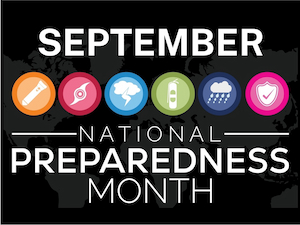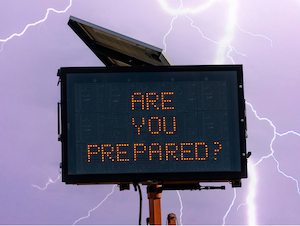National Preparedness Month is observed every September to encourage readiness at home and beyond. From severe weather to unexpected emergencies, preparation today builds resilience for tomorrow.

National Preparedness Month is a great opportunity for organizations to highlight the importance of being ready.
Employers can support the effort by sharing preparedness resources, encouraging employees to talk with their families about emergency plans, or even dedicating a safety meeting to at-home readiness.
When families are better prepared, entire communities and workplaces benefit too.
What Is National Preparedness Month?
The main goal of this nationwide awareness campaign is to equip Americans with the knowledge and tools to:
- Know the unique risks in their area
- Create family emergency plans
- Build emergency kits
- Engage in meaningful community preparedness efforts
Why This Month Matters
September marks the peak of hurricane activity, often sees heightened wildfire threats, and can have an increase in flooding or tornadoes in some regions making it a critical reminder that disasters can strike anytime, anywhere.
Planning now, including how to communicate if separated, where to seek shelter, or when to evacuate, can significantly reduce the impact of emergencies when they happen.
The month culminates in National Preparedness Day on September 30, serving as a nationwide call to action.
Four Key Steps to Be Prepared
National Preparedness Month generally focuses on at-home readiness, but it’s a great topic for a workplace safety meeting. Talking about family preparedness on the job can encourage employees to take action at home, which strengthens overall community resilience.
Emphasize these points with employees during a safety meeting about emergency preparedness:
- Learn Your Risks and Responses - Know what hazards could affect your area. Set up alert systems using tools like FEMA’s mobile app, Wireless Emergency Alerts, or NOAA Weather Radio.
- Make an Emergency Plan - Sit down with your family to establish communication strategies and meeting points, plan evacuation routes and shelter options, and discuss how to prepare for the needs of children, elders, pets, or those with medical requirements.
- Build an Emergency Kit - Pack supplies that can last at least 3 days including water, nonperishable food, a radio, flashlight, first-aid kit, and more. Don’t forget items that are specific to your family like prescription medication, pet supplies, or baby essentials.
- Engage Your Support Network - Share your plans with neighbors, friends, or caregivers.

Emergency Preparedness Resources
Ready.gov is a website dedicated to emergency preparedness that is full of resources including forms, checklists, infographics, and fillable templates to build your plan in under an hour.
On that website anyone can access easy-to-understand information on severe weather, power outages, emergency alerts, and more.
There’s also an entire section called Ready Business that focuses on how businesses can prepare in advance for disasters. This section also has helpful resources related to Response and Recovery as well as Business Continuity Plans.
Social Media Preparedness Toolkits are available for specific disaster types, for preparedness campaigns, and for community awareness. Use shareable social media posts during Preparedness Month to spread awareness, encourage conversations, and remind others to take action.
Why Preparedness Matters
A simple conversation and a well-stocked emergency supply kit can mean the difference between panic and survival. Taking time to talk with your family about what to do in an emergency ensures that everyone knows their role and can respond with confidence.
Supplies like food, water, flashlights, and first aid not only cover basic needs but also reduce stress when resources may be limited. Preparedness is more than just safety... it creates peace of mind, strengthens family bonds, and supports community resilience.
When individuals and households are ready, neighborhoods recover faster, workplaces experience fewer disruptions, and communities are better equipped to face whatever comes their way.


